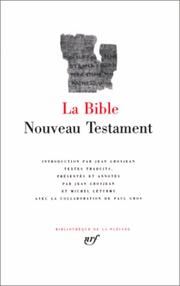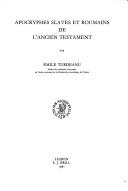| Listing 1 - 10 of 17 | << page >> |
Sort by
|

ISBN: 9789004509238 9789004026001 Year: 1971 Publisher: Leiden; Boston : BRILL
Abstract | Keywords | Export | Availability | Bookmark
 Loading...
Loading...Choose an application
- Reference Manager
- EndNote
- RefWorks (Direct export to RefWorks)
Apocryphes (Ancien Testament) --- Eschatology --- History of doctrines
Book
Year: 1898 Publisher: München : C.H. Beck,
Abstract | Keywords | Export | Availability | Bookmark
 Loading...
Loading...Choose an application
- Reference Manager
- EndNote
- RefWorks (Direct export to RefWorks)
Apocryphal books (Old Testament) --- Apocryphes (Ancien testament) --- Introductions --- Introductions --- Bible. --- Introductions.
Periodical
Abstract | Keywords | Export | Availability | Bookmark
 Loading...
Loading...Choose an application
- Reference Manager
- EndNote
- RefWorks (Direct export to RefWorks)
Apocryphal books --- Apocryphes (Ancien Testament) --- Critique, interprétation, etc. --- Apocryphal books. --- Apocryphal literature --- Pseudepigrapha --- Sacred books --- Jewish Life & Spirituality. --- Jewish Literature.
Book
ISBN: 2503503438 9782503503431 Year: 1993 Volume: *17 Publisher: Turnhout Brepols
Abstract | Keywords | Export | Availability | Bookmark
 Loading...
Loading...Choose an application
- Reference Manager
- EndNote
- RefWorks (Direct export to RefWorks)
Apocryphes (Ancien Testament) --- 276 =71 "03" --- 229*2 --- 470 --- 229 --- Latijnse patrologie--?"03" --- Apocriefen van het Oude Testament. Pseudepigrafen van het Oude Testament --- Language Latin --- Religion Bible Apocrypha, pseudepigrapha, intertestamental works --- 229*2 Apocriefen van het Oude Testament. Pseudepigrafen van het Oude Testament --- Denis, Albert-Marie --- Apocryphes (Ancien Testament) - Concordances latines
Book
ISBN: 9789042931282 9042931280 Year: 2014 Volume: 270 Publisher: Leuven Peeters
Abstract | Keywords | Export | Availability | Bookmark
 Loading...
Loading...Choose an application
- Reference Manager
- EndNote
- RefWorks (Direct export to RefWorks)
Bible. Apocrypha OT --- Apocriefe boeken (Oud Testament) --- Apocryphal books (Old Testament) --- Apocryphes [Livres ] (Ancien Testament) --- Bible. O.T. Apocryphal books --- Criticism and interpretation --- Biblicum --- Academic collection --- 229*2 --- Apocriefen van het Oude Testament. Pseudepigrafen van het Oude Testament --- Conferences - Meetings --- 229*2 Apocriefen van het Oude Testament. Pseudepigrafen van het Oude Testament --- Apocryphes (Ancien Testament) --- Livres apocryphes (Ancien Testament) --- Apocryphal books (New Testament) --- Criticism, interpretation, etc --- Apocryphal books (Old Testament) - Criticism and interpretation - Congresses --- Apocryphes --- Bible --- Ancien Testament

ISBN: 2070106438 2070111164 9782070111169 9782070106431 Year: 1987 Volume: 226 Publisher: Paris Gallimard
Abstract | Keywords | Export | Availability | Bookmark
 Loading...
Loading...Choose an application
- Reference Manager
- EndNote
- RefWorks (Direct export to RefWorks)
Apocryphal books (Old Testament) --- Apocryphes (Ancien Testament) --- Translations into French --- Traductions en français --- Dode-Zeerollen. (Bronnen) --- Apocryphes. Ancien Testament. --- Morte (Mer) (Manuscrits de la). (Sources) --- Apocriefen. Oud Testament. --- #GOCB:Biblia --- 229*2 --- 229*3 --- 229*2 Apocriefen van het Oude Testament. Pseudepigrafen van het Oude Testament --- Apocriefen van het Oude Testament. Pseudepigrafen van het Oude Testament --- 229*3 Dode Zeerollen en intertestamentaire literatuur --- Dode Zeerollen en intertestamentaire literatuur --- Bible --- Jewish religion --- Bible. Apocrypha OT --- Manuscrits de la mer Morte (français). 1987 --- Apocryphes. Bible. A.T. (français). 1987 --- la Bible --- écrits intertestamentaires --- écrits qoumraniens --- pseudépigraphes de l'Ancien Testament --- La Bible --- catholicisme
Periodical
Abstract | Keywords | Export | Availability | Bookmark
 Loading...
Loading...Choose an application
- Reference Manager
- EndNote
- RefWorks (Direct export to RefWorks)
Apocryphal books --- Apocryphal books (Old Testament) --- Apocryphal books (New Testament) --- Apocryphes --- Apocryphes (Ancien Testament) --- Apocryphes (Nouveau Testament) --- Periodicals. --- Criticism, interpretation, etc. --- Periodicals --- Périodiques --- Critique, interprétation, etc. --- Apocryphal books. --- 229 <05> --- Apocriefen. Pseudepigrafen. Deutero-canonieke boeken--Tijdschriften --- Arts and Humanities --- Social Sciences --- General and Others --- History --- Literature --- Religion
Periodical
ISSN: 11553316 20346468 Year: 1990 Publisher: Turnhout Brepols
Abstract | Keywords | Export | Availability | Bookmark
 Loading...
Loading...Choose an application
- Reference Manager
- EndNote
- RefWorks (Direct export to RefWorks)
Bible. Apocrypha --- Annuaires --- Jaarboeken --- Apocryphal books --- Apocryphes --- Periodicals --- Périodiques --- 22 <05> --- 229 --- Bijbel--Tijdschriften --- Apocriefen. Pseudepigrafen. Deutero-canonieke boeken --- Apocryphes (Ancien Testament) --- Apocriefen. --- Critique, interprétation, etc. --- Arts and Humanities --- Religion --- Périodiques --- Apocryphal literature --- Pseudepigrapha --- Sacred books --- Apocryphal books. --- Apocryphal books (New Testament) --- Apocryphal books (Old Testament) --- Criticism, interpretation, etc. --- Old Testament apocryphal books --- Pseudepigraphal books (Old Testament)
Book
ISBN: 9780674057623 0674057627 Year: 2017 Publisher: Cambridge, Massachusetts : Harvard University Press,
Abstract | Keywords | Export | Availability | Bookmark
 Loading...
Loading...Choose an application
- Reference Manager
- EndNote
- RefWorks (Direct export to RefWorks)
Sefer Zerubbabel, the Book of Zerubbabel, is a Hebrew apocalyptic work composed during the wars between the Byzantine and Persian empires in the early decades of the seventh century of this era, shortly before the Muslim conquest of the Middle East. Himmelfarb places Sefer Zerubbael's narrative in the context of Christian tradition and contemporary Byzantine culture on the one hand and earlier Jewish eschatological traditions on the other. The impact of the Christian messianic narrative can be seen in Sefer Zerubbabel's depiction of the messiah son of David in terms of Isaiah's suffering servant and in the death and resurrection of the messiah son of Joseph, while contemporary Byzantine ideas about the Virgin as the patron and protector of Constantinople help to make sense of Sefer Zerubbabel's otherwise startling depiction of the mother of the messiah as a warrior defending Jerusalem. Sefer Zerubbabel also shows many points of contact with traditions about the messiah in rabbinic literature, but, the author argues, it is not dependent on the rabbinic formulation of those traditions. Rather, both the rabbis and Sefer Zerubbabel drew on popular traditions, which they reshaped for their own purposes. The rabbis tend to play down messianic hopes while Sefer Zerubbabel embraces them more enthusiastically. Thus reading Sefer Zerubbabel and rabbinic literature side by side allows us to recover some elements of the popular Jewish messianism of the early centuries of the Christian era. The book concludes by considering Sefer Zerubbabel's impact on a corpus of Jewish eschatological texts from the centuries after the rise of Islam.--
Messiah --- Apocalyptic literature --- Eschatology, Jewish --- Christianity --- Apocryphal books (Old Testament) --- Judaism --- Messie --- Littérature apocalyptique --- Eschatologie juive --- Christianisme --- Apocryphes (Ancien Testament) --- Judaïsme --- Judaism. --- History and criticism. --- Influence. --- Criticism, interpretation, etc. --- History --- Sources. --- Judaïsme --- Histoire et critique --- Influence --- Critique, interprétation, etc. --- Histoire --- Sefer Zerubbabel.

ISBN: 9004063412 9789004063419 Year: 1981 Volume: v. 5 Publisher: Leiden Brill
Abstract | Keywords | Export | Availability | Bookmark
 Loading...
Loading...Choose an application
- Reference Manager
- EndNote
- RefWorks (Direct export to RefWorks)
Apocryphal books (Old Testament) --- Versions, Slavic --- Translations into Romanian --- Translations into Slavic --- History and criticism --- 229*2 --- -Old Testament apocryphal books --- Pseudepigraphal books (Old Testament) --- Apocriefen van het Oude Testament. Pseudepigrafen van het Oude Testament --- History and criticism. --- -Apocriefen van het Oude Testament. Pseudepigrafen van het Oude Testament --- 229*2 Apocriefen van het Oude Testament. Pseudepigrafen van het Oude Testament --- -229*2 Apocriefen van het Oude Testament. Pseudepigrafen van het Oude Testament --- Old Testament apocryphal books --- Translations into Romanian&delete& --- Translations into Slavic&delete& --- Apocriefen. Oud Testament. Versies (Roemeense). --- Apocryphes. Ancien Testament. Versions slaves. --- Apocryphes. Ancien Testament. Versions roumaines. --- Apocriefen. Oud Testament. Versies (Slavische). --- Apocryphal books (Old Testament) - Translations into Slavic - History and criticism --- Apocryphal books (Old Testament) - Translations into Romanian - History and criticism
| Listing 1 - 10 of 17 | << page >> |
Sort by
|

 Search
Search Feedback
Feedback About UniCat
About UniCat  Help
Help News
News